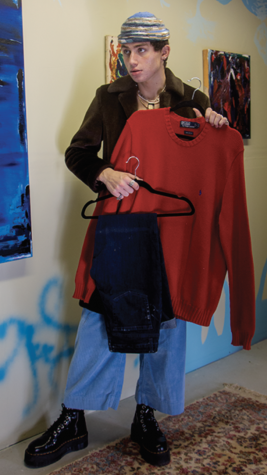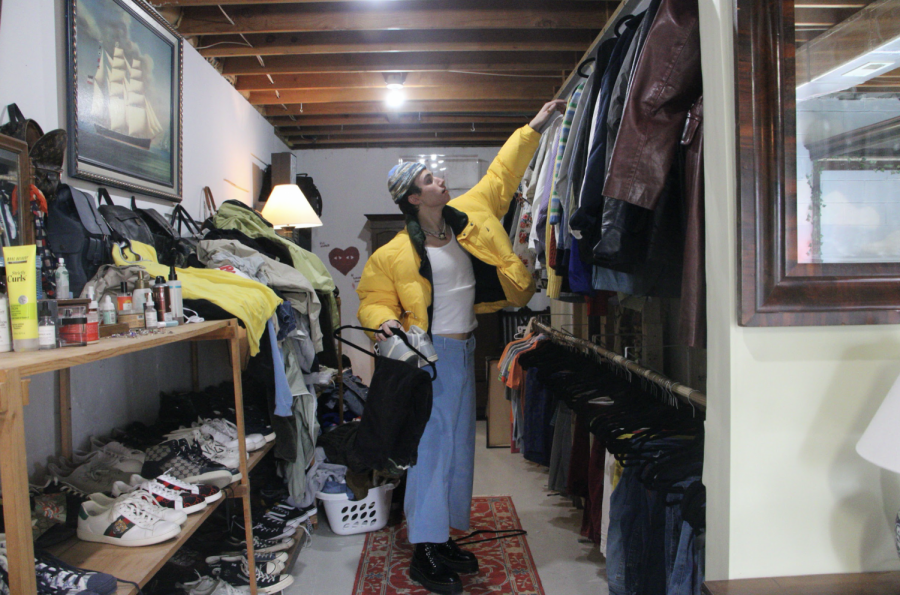Junior Victoria Simich has been sewing since she was in fourth grade, and since then has made many of her own clothes and accessories.
“(My style) is like I live in a van, but I don’t actually live in a van,” Simich said.
In recent years, the rules of fashion have changed immensely, and some people dress differently from conventional fashion norms. For the December issue of Vogue Magazine, Harry Styles will be the first man to appear solo on the magazine’s cover. This caused a large-scale conversation over personal style compared to societal expectations.
“I don’t like the typical style of fitting in, I feel like I’d feel lost if I were to feel something stereotypical, like where is my individuality?” Simich said. “I feel confident in the fact I dress differently.”
Social Worker Leanda Weimer said developing a sense of style can greatly impact a person’s mental health.
“Having a style and liking what you wear is definitely good for your mental health, and it can make you more motivated to do things, but most importantly it can make you feel more confident in who you are,” Weimer said.
Junior Richard Reinsch said he agrees with this sentiment: “You have to find what makes you feel comfortable, no matter what that is.”

While his style has evolved over the years, Reinsch said he used his personal experiences to find what he was most comfortable in.
He said, “I had always gone thrifting and to garage sales as a necessity when I was little. It was something that was embarrassing and I felt like I had to compete with (the kids at my private school), but once I saw it as a part of me and as cool, I started to incorporate sewing and things into my outfits. When I really loved something, to put the extra work (to alter it) made it something really special.”
Weimer said she notices a difference in her mindset when she gets dressed up, and she tries to get dressed up even when she’s sick.
“It puts a pep in your step, and a little more motivation behind what you do,” she said. “People are more likely to treat you with more respect (when you’re dressed up).” While Weimer attended Ohio Christian University, a college that would not allow students to wear loungewear to class in order to prepare students for professionalism and future work environments.
Simich’s experiences and beliefs have also shaped her style. She said she set a goal for herself this year to not contribute to fast fashion due to environmental concerns, and believes she has been fairly successful. By making many of her own clothes, Simich eliminates a lot of clothing waste, and after discovering a brand that reuses fabric scraps that are too small for other projects by creating a completely new “quilt-like” textile, she said she has been able to try out new and creative ways to eliminate her unnecessary waste.

Through altering his own clothes and his personal journey with fashion, Reinsch has greatly changed the way he views fashion and categorizing the way he sees people. His mindset on fashion comes into his daily life as well.
“Not everyone is in the same frame of mind or in the same situation as you, so you need to be kind to everyone and understand they are doing what makes them comfortable,” Reinsch said.
“What’s comfortable for you may not be comfortable for someone else, and you never want to force your thoughts and standards onto someone else.”

































![AI in films like "The Brutalist" is convenient, but shouldn’t take priority [opinion]](https://hilite.org/wp-content/uploads/2025/02/catherine-cover-1200x471.jpg)










































![Review: “The Immortal Soul Salvage Yard:” A criminally underrated poetry collection [MUSE]](https://hilite.org/wp-content/uploads/2025/03/71cju6TvqmL._AC_UF10001000_QL80_.jpg)
![Review: "Dog Man" is Unapologetically Chaotic [MUSE]](https://hilite.org/wp-content/uploads/2025/03/dogman-1200x700.jpg)
![Review: "Ne Zha 2": The WeChat family reunion I didn’t know I needed [MUSE]](https://hilite.org/wp-content/uploads/2025/03/unnamed-4.png)
![Review in Print: Maripaz Villar brings a delightfully unique style to the world of WEBTOON [MUSE]](https://hilite.org/wp-content/uploads/2023/12/maripazcover-1200x960.jpg)
![Review: “The Sword of Kaigen” is a masterpiece [MUSE]](https://hilite.org/wp-content/uploads/2023/11/Screenshot-2023-11-26-201051.png)
![Review: Gateron Oil Kings, great linear switches, okay price [MUSE]](https://hilite.org/wp-content/uploads/2023/11/Screenshot-2023-11-26-200553.png)
![Review: “A Haunting in Venice” is a significant improvement from other Agatha Christie adaptations [MUSE]](https://hilite.org/wp-content/uploads/2023/11/e7ee2938a6d422669771bce6d8088521.jpg)
![Review: A Thanksgiving story from elementary school, still just as interesting [MUSE]](https://hilite.org/wp-content/uploads/2023/11/Screenshot-2023-11-26-195514-987x1200.png)
![Review: "When I Fly Towards You", cute, uplifting youth drama [MUSE]](https://hilite.org/wp-content/uploads/2023/09/When-I-Fly-Towards-You-Chinese-drama.png)
![Postcards from Muse: Hawaii Travel Diary [MUSE]](https://hilite.org/wp-content/uploads/2023/09/My-project-1-1200x1200.jpg)
![Review: "Ladybug & Cat Noir: The Movie," departure from original show [MUSE]](https://hilite.org/wp-content/uploads/2023/09/Ladybug__Cat_Noir_-_The_Movie_poster.jpg)
![Review in Print: "Hidden Love" is the cute, uplifting drama everyone needs [MUSE]](https://hilite.org/wp-content/uploads/2023/09/hiddenlovecover-e1693597208225-1030x1200.png)
![Review in Print: "Heartstopper" is the heartwarming queer romance we all need [MUSE]](https://hilite.org/wp-content/uploads/2023/08/museheartstoppercover-1200x654.png)




